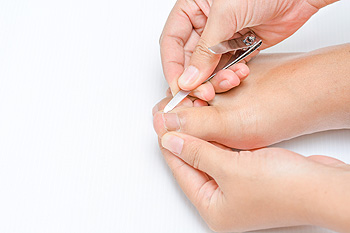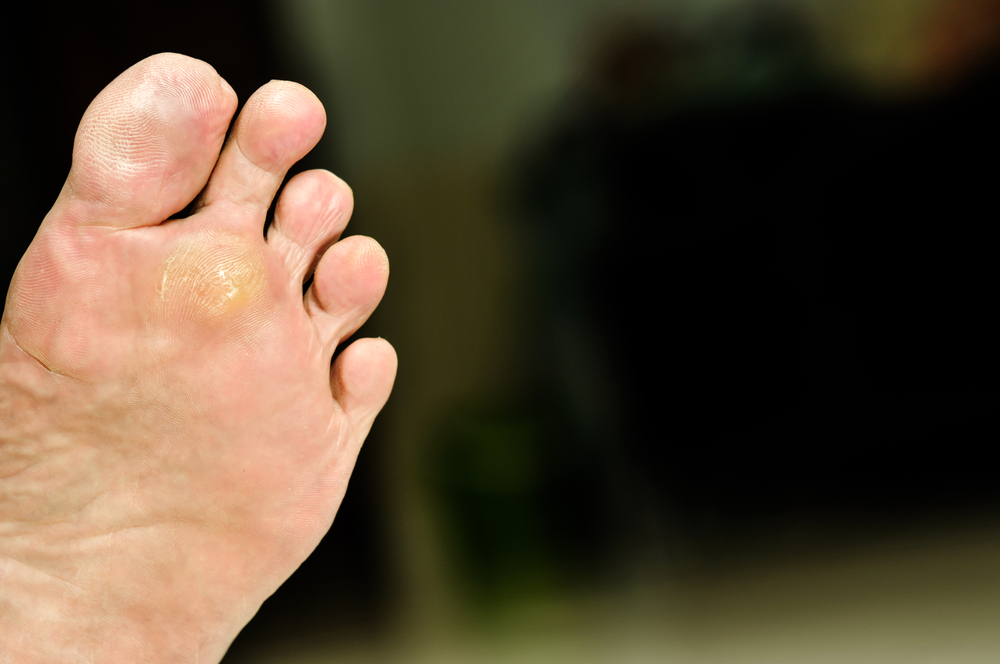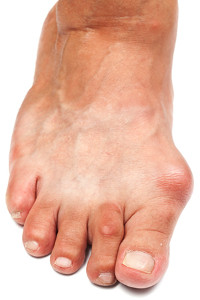
 Ingrown toenails can be painful, which is why it is important that you deal with them as soon as possible. Irritation from ingrown toenails usually occurs when the nail itself grows into the skin that surrounds it. It is more common for ingrown toenails to develop on the big toe compared to other smaller toes. The most common cause for this ailment is trimming the toenail improperly. If you cut your toenail too short, your skin may grow over the nail, and as the nail grows, it may grow into the skin. Another common cause for ingrown toenails is wearing shoes or socks that are too tight, this is because doing so adds pressure to the skin around the toenail and pushes it against the sharp edge of the nail.
Ingrown toenails can be painful, which is why it is important that you deal with them as soon as possible. Irritation from ingrown toenails usually occurs when the nail itself grows into the skin that surrounds it. It is more common for ingrown toenails to develop on the big toe compared to other smaller toes. The most common cause for this ailment is trimming the toenail improperly. If you cut your toenail too short, your skin may grow over the nail, and as the nail grows, it may grow into the skin. Another common cause for ingrown toenails is wearing shoes or socks that are too tight, this is because doing so adds pressure to the skin around the toenail and pushes it against the sharp edge of the nail.
Ingrown toenails can become painful if they are not treated properly. For more information about ingrown toenails, contact Dr. Robert Hope of Riverside Podiatry. Our doctor can provide the care you need to keep you pain-free and on your feet.
Ingrown Toenails
Ingrown toenails occur when a toenail grows sideways into the bed of the nail, causing pain, swelling, and possibly infection.
Causes
Prevention
Because ingrown toenails are not something found outside of shoe-wearing cultures, going barefoot as often as possible will decrease the likeliness of developing ingrown toenails. Wearing proper fitting shoes and using proper cutting techniques will also help decrease your risk of developing ingrown toenails.
Treatment
Ingrown toenails are a very treatable foot condition. In minor cases, soaking the affected area in salt or antibacterial soaps will not only help with the ingrown nail itself, but also help prevent any infections from occurring. In more severe cases, surgery is an option. In either case, speaking to your podiatrist about this condition will help you get a better understanding of specific treatment options that are right for you.
If you have any questions please feel free to contact our office located in Tuscaloosa, and Fayette, AL . We offer the newest diagnostic and treatment technologies for all your foot needs.
Read more about Ingrown Toenail Care If you experience a growth of bottom of your foot, you may have what is referred to as a plantar wart. Generally, warts will grow upwards from the skin, but a plantar wart will grow into the sole of the foot because of pressure on the foot from walking and standing. One of the first symptoms that may be noticed can be severe pain and discomfort, and will worsen over time if not treated properly. It is typically caused by the human papillomavirus and can enter the skin through small cuts that may be present on the sole of the foot. This is considered to be a contagious condition and appropriate shoes are suggested to be worn in public showers, pools and surrounding areas. Seeking the advice of a podiatrist is advised for proper treatment or removal techniques if you are affected by this uncomfortable and often very painful condition.
If you experience a growth of bottom of your foot, you may have what is referred to as a plantar wart. Generally, warts will grow upwards from the skin, but a plantar wart will grow into the sole of the foot because of pressure on the foot from walking and standing. One of the first symptoms that may be noticed can be severe pain and discomfort, and will worsen over time if not treated properly. It is typically caused by the human papillomavirus and can enter the skin through small cuts that may be present on the sole of the foot. This is considered to be a contagious condition and appropriate shoes are suggested to be worn in public showers, pools and surrounding areas. Seeking the advice of a podiatrist is advised for proper treatment or removal techniques if you are affected by this uncomfortable and often very painful condition.
Plantar warts can be very uncomfortable. If you need your feet checked, contact Dr. Robert Hope from Riverside Podiatry. Our doctor will assist you with all of your foot needs.
About Plantar Warts
Plantar warts are the result of HPV, or human papillomavirus, getting into open wounds on the feet. They are mostly found on the heels or balls of the feet.
While plantar warts are generally harmless, those experiencing excessive pain or those suffering from diabetes or a compromised immune system require immediate medical care. Plantar warts are easily diagnosed, usually through scraping off a bit of rough skin or by getting a biopsy.
Symptoms
Treatment
To help prevent developing plantar warts, avoid walking barefoot over abrasive surfaces that can cause cuts or wounds for HPV to get into. Avoiding direct contact with other warts, as well as not picking or rubbing existing warts, can help prevent the further spread of plantar warts. However, if you think you have developed plantar warts, speak to your podiatrist. He or she can diagnose the warts on your feet and recommend the appropriate treatment options.
If you have any questions please feel free to contact our office located in Tuscaloosa, and Fayette, AL . We offer the newest diagnostic and treatment technologies for all your foot needs.
Read more about All About Plantar Warts Recent research has shown a connection between foot pain and being obese. Foot ailments that may develop as a result of obesity include flat feet, arthritis, diabetes and general heel pain. Obesity may alter the general structure of the foot as a result of the heels and s enduring additional pressure caused by excess weight. Exercising may become difficult due to an increase in weight, and this may hinder one's ability to shed the excess pounds. Your feet will benefit if you choose to wear wide and supportive shoes, although there may be a limited selection of larger sizes necessary to accommodate them. Implementing a daily exercise routine and maintaining a healthy lifestyle may aid in combating obesity. This can typically be achieved by slowly beginning to properly stretch and exercise the feet. Please consider scheduling a consultation with a podiatrist for a recommended exercise program that may avoid foot pain.
Recent research has shown a connection between foot pain and being obese. Foot ailments that may develop as a result of obesity include flat feet, arthritis, diabetes and general heel pain. Obesity may alter the general structure of the foot as a result of the heels and s enduring additional pressure caused by excess weight. Exercising may become difficult due to an increase in weight, and this may hinder one's ability to shed the excess pounds. Your feet will benefit if you choose to wear wide and supportive shoes, although there may be a limited selection of larger sizes necessary to accommodate them. Implementing a daily exercise routine and maintaining a healthy lifestyle may aid in combating obesity. This can typically be achieved by slowly beginning to properly stretch and exercise the feet. Please consider scheduling a consultation with a podiatrist for a recommended exercise program that may avoid foot pain.
The more you weigh, the harder your feet must work to support your body. If you’re an obese individual and are concerned about your feet, contact Dr. Robert Hope from Riverside Podiatry. Our doctor can provide the care you need to keep you pain-free and on your feet.
Obesity and Your Feet
People who are overweight are putting more pressure on their s, knees, and hips as well as their feet. This unfortunately can lead to variety of different issues.
Problems & Complications Stemming from Obesity
If you have any questions, please feel free to contact our office located in Tuscaloosa, and Fayette, AL . We offer the newest diagnostic and treatment technologies for all your foot care needs.
Read more about How Obesity Affects Your Feet Bunions are typically the result of a bone deformity that affects the toes. The big toe typically leans toward the second toe, and this may cause a bump to form on the bottom of the big toe. Fluid may develop in the surrounding joint, in addition to the skin becoming thickened. This is often a painful condition, and as a result other ailments such as arthritis may develop. Research has shown that it’s beneficial to wear proper shoes that can accommodate the bunion and possibly diminish the pain and discomfort. Relief options may include using adequate padding over the bunion for protection, and wearing shoes that can adjust to the width of your foot. For bunions that have become extremely painful and unmanageable, surgery may be an option to consider. It’s suggested to schedule a consultation with a podiatrist to learn about the best treatment options for you.
Bunions are typically the result of a bone deformity that affects the toes. The big toe typically leans toward the second toe, and this may cause a bump to form on the bottom of the big toe. Fluid may develop in the surrounding joint, in addition to the skin becoming thickened. This is often a painful condition, and as a result other ailments such as arthritis may develop. Research has shown that it’s beneficial to wear proper shoes that can accommodate the bunion and possibly diminish the pain and discomfort. Relief options may include using adequate padding over the bunion for protection, and wearing shoes that can adjust to the width of your foot. For bunions that have become extremely painful and unmanageable, surgery may be an option to consider. It’s suggested to schedule a consultation with a podiatrist to learn about the best treatment options for you.
If you are suffering from bunion pain, contact Dr. Robert Hope of Riverside Podiatry. Our doctor can provide the care you need to keep you pain-free and on your feet.
What Is a Bunion?
Bunions are painful bony bumps that usually develop on the inside of the foot at the joint of the big toe. As the deformity increases over time, it may become painful to walk and wear shoes. Women are more likely to exacerbate existing bunions since they often wear tight, narrow shoes that shift their toes together. Bunion pain can be relieved by wearing wider shoes with enough room for the toes.
Causes
Symptoms
In order to diagnose your bunion, your podiatrist may ask about your medical history, symptoms, and general health. Your doctor might also order an x-ray to take a closer look at your feet. Nonsurgical treatment options include orthotics, padding, icing, changes in footwear, and medication. If nonsurgical treatments don’t alleviate your bunion pain, surgery may be necessary.
If you have any questions, please feel free to contact our office located in Tuscaloosa, and Fayette, AL . We offer the newest diagnostic and treatment technologies for all your foot care needs.
Read more about Bunions